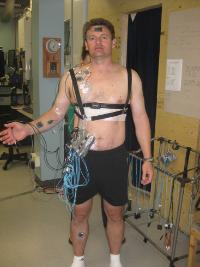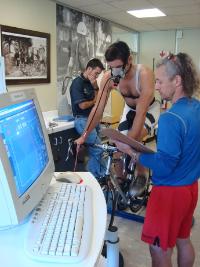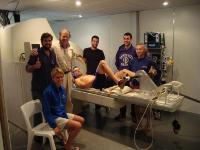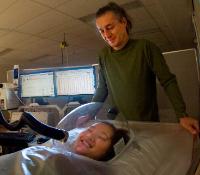Research and lab
Dr. Basset’s research activities and interests currently focus on the following areas:
Post-metabolic response to hypoxic exposure
Metabolic adjustments induced by the reduced partial pressure of oxygen have an impact on the contribution of different substrates to energy production and ATP synthesis. Recovery from acute and short-term moderate hypoxic exposure has not been extensively studied. The underlying mechanisms are not fully understood. Research in my laboratory aims to examine human metabolic response to acute, intermittent hypoxic exposure at rest and during exercise and its applications in nutrition, pharmacology, and environmental medicine. A better understanding of the mechanisms underlying metabolic responses to acute, intermittent hypoxic exposure might benefit Canadians, notably those affected by chronic diseases.
Metabolic and other responses to long-term cold exposure

The timeframe for a mass rescue incident in the Arctic region is currently estimated at 5-7 days. At present, the majority of physiological studies on cold exposure involves exposure to very cold conditions where ethical limits for hypothermia are reached within 4-6 hours, due to the high rates of heat loss. Dr. Basset and colleagues intend to fill this research gap by exposing subjects to moderate cold for long periods of time. The aim of this research program is to examine the long-term cold exposure effects on substrate contribution to energy production; heat balance (i.e., thermoregulation); functions of major physiological systems (i.e., cardiorespiratory system, nervous system, renal system, digestive system); and food intake (e.g., effect of food composition on metabolic response).
Cardiorespiratory responses to exercise

Dr. Basset has developed research projects that integrate cardiorespiratory physiology and motor control to assess human performance, as well as acute and chronic (i.e., acclamatory) responses to physical training. This involves the study of metabolic and biomechanical/motor control responses to exercise in an integrative manner. This research represents a new theoretical corpus, emphasizing the impact of athletic profile on sport performance. Recent work in this area has been published in international peer-reviewed journals, conference proceedings, and abstract
Muscle coordination and central and peripheral fatigue

The origin of performance decrement induced by repetitive skeletal muscle contractions is still debated in exercise sciences. Undoubtedly, the muscle contractile apparatus becomes less efficient when undergoing high-intensity exercise; however, the central nervous system (CNS) also fatigues. The study of fatigue phenomena should include both the role of central motor drive, as well as peripherally-based, metabolite-induced failure of skeletal muscle contractile function, independent of the CNS. There is a growing body of literature suggesting that performance is regulated by the CNS, specifically to ensure that a catastrophic failure of homeostasis does not occur during voluntary exercise. Exposure to acute hypoxia triggers several metabolic and neuromuscular responses to adjust and compensate for reduced arterial oxygen, significantly affecting aerobic capacity. It is also suggested that the central nervous system receives sensory input from muscle afferents that regulates the central motor drive to adjust for intramuscular metabolite accumulation, and that under hypoxic stress the termination of exercise may be the result of direct effects of oxygen deficit on the brain. Dr. Basset’s research aims to investigate muscle coordination modifications induced by exercising under acute normobaric hypoxia, versus normoxia. It also aims to determine whether muscle coordination modifications precede or follow the development of peripheral fatigue.
Healthy Metabolism

The objectives of the project aim to assess the impact of fitness on metabolic health in obese individuals. The novelty of this project resides in its experimental design that examines fitness and body composition independently. The purpose of this research program is to show how obese but fit individuals are protected from many adverse health conditions such as metabolic syndrome, insulin resistance, non-insulin dependent diabetes mellitus, increased blood pressure, cardiovascular disease as the result of being physically active. Understanding how fitness can modulate the metabolic impacts of obesity is an important step in developing better strategies to improve the health of patients. By providing solid evidence on the actual contribution of fitness to metabolic health, as well as evidence to the underlying mechanisms by which this happens, our project will provide objective measures to better evaluate the risk to patients and guide both clinicians and researchers toward better targets for lifestyle or pharmacological intervention.

Within the Human Physiology and Environmental Physiology laboratories at the School of Human Kinetics and Recreation, Dr. Basset has access to, and utilizes various experimental tools, applications, and equipment:
• Metabolic cart (for exercise tests [e.g., VO2max], substrate partitioning, and basal metabolic rate [BMR]);
• Ergometers (arm-crank, treadmills, VeloTron Ergocycle);
• Electrocardiogram (ECG);
• Spirometer;
• O2 Saturation (SpO2);
• Blood lactate (BLa) lancet / analyzer;
• Hydrostatic weighing;
• Cold water immersion (tank with water cooling system [down to 5°C]);
• Normobaric hypoxia (nitrogen filter technique).